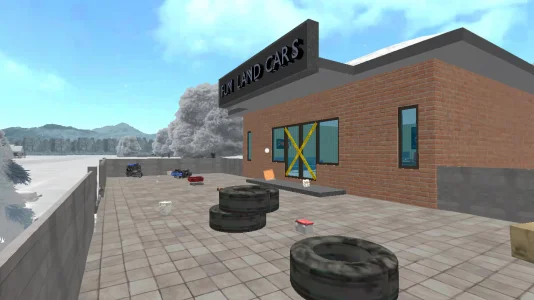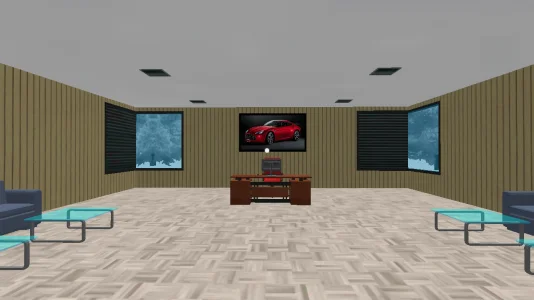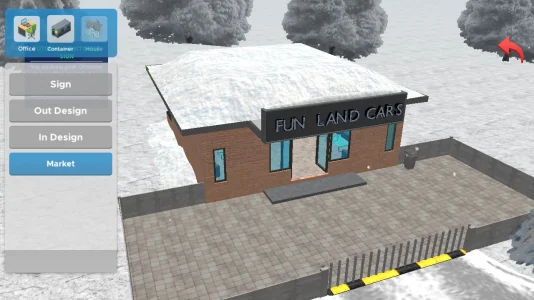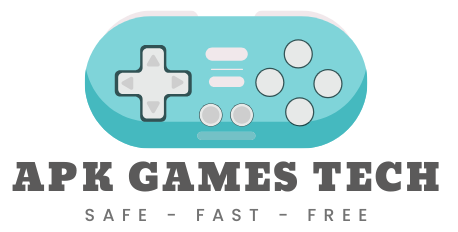Download Car Saler Simulator Dealership MOD Free
*Car Saler Simulator Dealership* is a single-player management simulation game developed by Fun Land Games. The game’s key concept requires the player to build a used car dealership empire. This objective is achieved through a core gameplay loop of acquiring distressed vehicles, performing mechanical and cosmetic refurbishment, and negotiating sales with customers. The central challenge involves strategically reinvesting profits from this inventory to expand business operations and facilities.
Gameplay Screenshots



About This Game
An In-Depth Analysis of Car Saler Simulator Dealership
Car Saler Simulator Dealership provides a comprehensive management simulation experience for the Android and iOS mobile platforms. This title, developed and published by Fun Land Games, positions players as aspiring entrepreneurs in the competitive used car market. The game's architecture is built around a single-player, offline-capable core, inviting users to transform a modest car lot into a thriving dealership empire. Its primary appeal is rooted in the strategic cycle of acquiring, restoring, and selling vehicles for maximum profit, a classic gameplay loop within the Tycoon genre. This analysis delves into the foundational specifications, gameplay mechanics, and technical architecture of the application. It clarifies the game's identity in a crowded market, details its operational structure, and provides strategic guidance based on its core design principles. Furthermore, it addresses the significant technical considerations related to its free-to-play monetization model, offering a complete picture for users evaluating the APK for installation.Foundational Specifications and Market Identity
Developer and Genre Classification
Fun Land Games serves as the official mobile developer and publisher for Car Saler Simulator Dealership. The game is classified within the Simulation, Management, and Tycoon genres, featuring casual gameplay mechanics tailored for a mobile audience. While it primarily targets the Android ecosystem, related versions are also distributed on iOS platforms. The extensive version history, with recent updates advancing the application to version 1.72, indicates a sustained period of development and maintenance, assuring players of an active product lifecycle.Title Disambiguation and Verification
A crucial point of clarification involves distinguishing this mobile title from similarly named games on other platforms. Car Saler Simulator Dealership by Fun Land Games must not be confused with the PC title, Car Dealership Simulator, which was developed by Quadfix Games and released in May 2023. The mobile gaming landscape frequently utilizes analogous naming conventions to attract players familiar with popular PC simulations. Users intending to download the APK must verify that the package name and digital signature correspond directly to Fun Land Games to ensure they are installing the correct mobile application.Technical Requirements and Installation Profile
Minimum System Specifications
The application maintains a low technical barrier to entry, contributing to its broad accessibility. The minimum required operating system is Android 8.1.0+, a version that encompasses a vast majority of active Android devices. While explicit CPU benchmarks are not published, the simulation's demands infer a need for reasonable processing power. A minimum of 2GB of RAM is considered necessary, though a configuration with 4GB or more is highly recommended. This higher recommendation stems from user-reported stability issues, where the aggressive loading of in-game advertisements appears to strain the resources of lower-specification hardware, leading to performance degradation.Storage and Connectivity Requirements
Car Saler Simulator Dealership features a relatively compact file footprint, with the initial APK size ranging from 119 MB to 155 MB. The game utilizes an integrated APK structure, meaning core OBB data is packaged within the installation file, which simplifies the manual sideloading process by eliminating the need to manage separate data files. After full installation, the total storage space occupied is approximately 250 MB to 350 MB. The core gameplay loop is explicitly designed for offline play, allowing users to manage their dealership without a persistent internet connection. However, connectivity becomes mandatory for downloading updates, processing in-app purchases, and loading the video advertisements that are central to its free-to-play design.Gameplay Architecture and Core Mechanics
Game Modes and Structure
The experience is centered exclusively on a single-player structure. The main component is the Career Mode, which functions as a dealership tycoon simulation. Players begin with minimal capital and a small lot, engaging in the full business cycle of the used car industry. Progression is achieved through financial management, facility expansion, customer relations, and the eventual hiring of employees to automate tasks and scale the operation. The game also incorporates a competitive element through its Drag Races mode. This feature allows players to test their modified vehicles against others. Given the game's offline and single-player focus, this competition is asynchronous, pitting players against AI-controlled opponents, ghost data from other users, or static leaderboard rankings rather than engaging in real-time PvP.The Core Gameplay Loop
The central activities that players will repeatedly engage in form a satisfying and strategic loop. Mastering this cycle is essential for progression and profitability.- Vehicle Acquisition: Players source their inventory from various locations, each offering a different risk-to-reward ratio. These include cheap finds in the Neighborhood, variable-quality cars at Auctions, and offerings from Private Sellers.
- Refurbishment and Restoration: Once acquired, a vehicle requires repair. Mechanical fixes are handled through a streamlined interface for part replacement. More critically, cosmetic restoration—including washing, waxing, sanding rust, and repainting—plays a pivotal role in increasing a car's market value.
- Sales and Negotiation: Restored cars are placed in the showroom for sale. The player interacts with prospective customers, recommends suitable vehicles, and enters into a price negotiation. Successful negotiation requires patience to achieve the highest possible price within the user interface's indicated value range.
- Growth and Automation: Profits are reinvested into the business to upgrade the showroom, expand the lot, and improve the service center. As the business grows, players can hire mechanics and sales staff to delegate tasks and increase sales volume.
Control Scheme and Progression
The game is fully optimized for mobile touchscreens. A virtual joystick controls player movement within the 3D environment, while tapping and swiping gestures handle all interactions, from vehicle inspection to menu navigation. Player progression is linked to experience points earned from successful sales, which unlocks higher-level facility upgrades and access to more lucrative vehicle classes like luxury and classic cars. The game's design places a disproportionately high strategic value on a vehicle's aesthetic condition, as customer AI appears to prioritize visual appeal over mechanical integrity. This structural choice guides players to focus their early investments on cosmetic repairs as the most effective profit multiplier.Strategic Guidance for Players
Initial Steps for Efficient Growth
New players should adopt a disciplined approach to maximize early capital accumulation. The first step involves sourcing the cheapest possible vehicles from the neighborhood or junkyard, as cars from established dealerships are priced too high for profitable flipping. Initial funds should be allocated to cosmetic refurbishment—washing, polishing, and rust removal—as this provides the highest immediate return on investment. During negotiation, patience is paramount; players should always aim for the highest price bracket to avoid sacrificing long-term growth for quick sales. Early profits are best reinvested in expanding lot size and upgrading negotiation skills.Advanced Profit Maximization
To accelerate progression, advanced players can exploit specific mechanics. The practice of rolling back an odometer, when available, can artificially inflate a vehicle's perceived value. As capital becomes more stable, focusing on specialized, high-margin vehicle classes, such as sports cars, is a viable strategy for generating substantial profits. Resource optimization is also key. Players should use cheaper, used components for basic repairs and reserve expensive performance parts for vehicles intended for drag racing or premium sales. Hiring employees represents a significant daily cost and should only be considered once the dealership has a consistently high volume of sales to justify the expense.Monetization, User Feedback, and Technical Stability
Free-to-Play Model and Advertisement Impact
Car Saler Simulator Dealership operates on a free-to-play model, with progression fully achievable without payment. Optional in-app purchases are available to acquire currency or boosters. However, the game's primary financial engine is advertisement revenue. User feedback consistently highlights that the ad implementation is the single greatest source of friction. Advertisements are reported to be excessively frequent and highly intrusive, often appearing mid-task and interrupting the core gameplay flow. This aggressive ad delivery system is also poorly optimized, leading to significant technical instability. The game frequently freezes or crashes during ad sequences, particularly on devices with limited processing power. This instability has been linked to data integrity issues, with some users reporting that daily rewards earned from watching an ad can disappear immediately after.Synthesis of User Reviews
Community sentiment is sharply divided. Players express strong approval for the core management simulation concept, praising the engaging gameplay loop and the satisfaction of building a dealership empire. Conversely, there is a critical rejection of the monetization system's execution. The overwhelming volume and disruptive nature of the ads, coupled with the performance issues they cause, are the most common points of criticism. Functional bugs, such as missions failing to register completion and daily prizes being revoked, further detract from the experience. This feedback indicates that while the game's foundation is compelling, its usability is severely compromised by a monetization strategy that prioritizes ad revenue over technical stability and user retention.A Comprehensive Guide to Car Saler Simulator Dealership
Car Saler Simulator Dealership presents a single-player management simulation experience. The player’s primary objective involves transforming a modest car lot into a thriving dealership empire. The core gameplay loop compels players to acquire vehicles, perform refurbishments, and engage in skillful negotiation with customers. Success in this simulation depends on the strategic reinvestment of profits into business expansion and operational upgrades.
Core Gameplay Mechanics and Operational Loop
Vehicle Acquisition and Sourcing
Player progression begins with the acquisition of used vehicles. The game world offers several distinct sourcing locations, each presenting a unique risk-to-reward profile. Players can find inexpensive cars in the Neighborhood or at Auctions, which hold significant profit potential despite variable quality. The simulation also includes Private Sellers and other Dealerships, though vehicles from these sources typically have higher acquisition costs, making them less suitable for profit-oriented flipping in the early stages of the game.
The Refurbishment and Restoration Process
After acquisition, a vehicle requires comprehensive refurbishment to maximize its market value. This process contains two critical components: mechanical fixes and cosmetic restoration. Mechanical repairs are managed through a simplified interface where players replace specific parts. Cosmetic work, however, often provides a greater impact on the final sale price. These cosmetic tasks include washing, waxing, sanding rust, applying putty, and repainting the vehicle. An additional mechanic allows the player to roll back the odometer, a feature that can artificially enhance a car’s perceived value to potential buyers.
Sales, Negotiation, and Customer Interaction
The final phase of the core loop is the sale. Players must strategically place restored vehicles in their showroom to attract customers. Interacting with a customer requires the player to recommend a suitable car and then enter a price negotiation sequence. The user interface displays a negotiation bracket, with the highest price range often marked in a “red” zone. Successful negotiation, which results in higher profit margins, demands patience from the player to secure a price within this optimal range.
Progression Systems and Dealership Expansion
Player Experience and Facility Upgrades
The player’s progression is directly tied to the accumulation of experience points. These points are earned from successful vehicle sales and the completion of various in-game challenges. Gaining experience unlocks access to higher-level facility upgrades and more profitable classes of vehicles, such as luxury or classic cars. Profits generated from sales are the primary resource for funding these business expansions, which include increasing the showroom lot size and improving the service center.
Automation and Staff Management
As the business grows, players can automate repetitive tasks by hiring employees. The game allows the hiring of mechanics and sales personnel to manage the increasing volume of inventory. This automation is a crucial step in scaling the operation from a small lot to a large dealership. However, hiring staff introduces a fixed daily cost in wages. Strategic players should only invest in employees once their sales volume is consistently high enough to justify the significant recurring expenditure.
Game Modes and Competitive Elements
The Central Career Mode
The primary gameplay experience unfolds within the Career Mode. This mode functions as a dealership tycoon simulation where the player manages all aspects of the business. The entire cycle of sourcing, refurbishing, marketing, and selling vehicles occurs within this single-player framework. The game’s design explicitly supports offline play, allowing players to advance their dealership empire without a persistent internet connection.
Competitive Drag Racing
Beyond the core management simulation, the game includes a competitive drag racing mode. This feature allows players to test their modified vehicles against opponents. Because the core game supports offline play, this competition is asynchronous. Players compete against AI-controlled opponents, ghost data derived from other players’ performance, or for placement on static global leaderboards. This mode provides an incentive for players to invest in high-performance mechanical parts for specific vehicles.
Strategic Guide for Effective Dealership Management
Achieving rapid progression and maximizing profitability in Car Saler Simulator Dealership requires a disciplined and strategic approach. The game’s mechanics reward specific player behaviors and resource allocation decisions. New players should focus on building a strong capital base, while advanced players can exploit specific market dynamics for accelerated growth.
Essential Tips for Building Your Empire
Adhering to a clear operational strategy is critical for success. The following steps outline a proven path for efficient growth and capital management:
- Prioritize Cosmetic Condition Over Mechanical Perfection: The game’s architecture places a disproportionately high value on a vehicle’s aesthetic appeal. Customers react more favorably to a visually pristine car. Therefore, a player’s initial investment should focus on washing, polishing, rust removal, and fresh paint, as these actions yield the highest immediate return on investment.
- Practice Patience in Price Negotiation: The negotiation mechanic is a core test of player discipline. Accepting a customer’s first offer significantly reduces potential profit. Players should consistently aim to secure a final sale price within the highest bracket indicated by the user interface, even if it requires a longer negotiation period.
- Source Inventory Strategically: In the early game, capital is limited. Players must source the cheapest available vehicles from low-cost locations like the neighborhood or junkyard. Acquiring expensive cars from other dealerships is a poor initial strategy, as the low profit margin does not justify the high capital risk.
- Delay Major Mechanical Investments: Replacing expensive engine components or performance parts is often not cost-effective for vehicles intended for flipping. These high-cost upgrades should be reserved for specialized vehicles built for the drag racing mode or for high-end classic cars sold later in the game.
- Manage Expansion and Hiring Costs: Business growth requires careful financial management. Players should resist the impulse to perform expensive facility upgrades or hire employees too early. Staffing should only occur when the dealership’s sales volume consistently generates enough profit to cover daily wage expenses without stalling cash flow.
Advanced Profit-Enhancement Techniques
Experienced players can further optimize their operations by leveraging deeper game systems. The odometer rollback feature, when used, can superficially increase a vehicle’s perceived value by lowering its displayed mileage, allowing for a higher initial asking price. Furthermore, once a stable capital flow is established, players should focus on specializing in high-margin vehicle classes, such as sports cars or classics. These targeted inventory decisions, combined with fully upgraded facilities, can generate massive profits and accelerate the player’s journey toward becoming a dealership tycoon.
